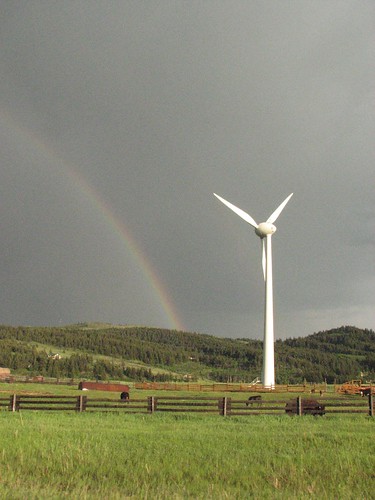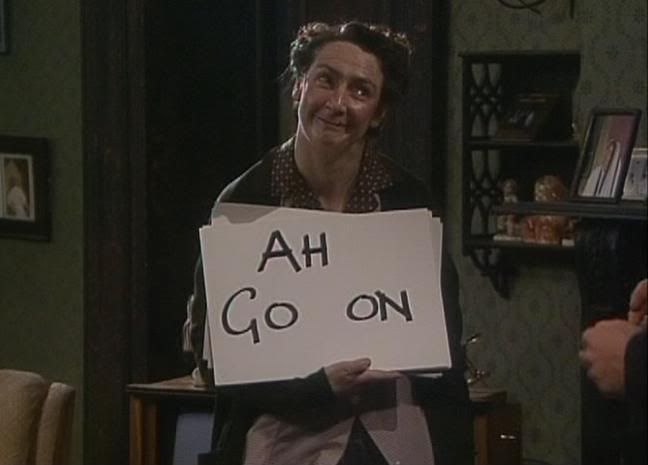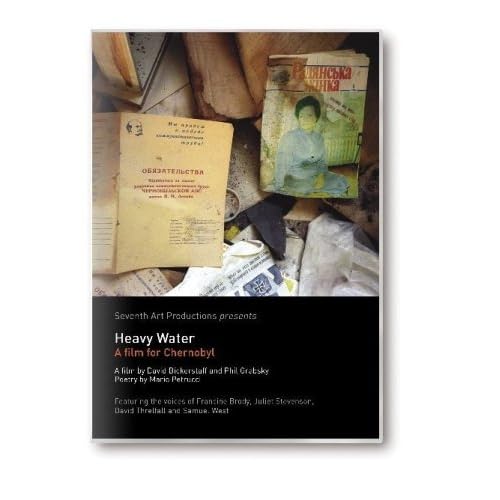
There's been a lot of buzz in both British and Irish media in the past month or so about "going nuclear." Britain has recently committed to a new build of nuclear power plants, "to fight climate change."
Reasons why nuclear makes NO sense:
1: Supporters of nuclear often make the case that nuclear power doesn't produce C02 emissions. This is not true. This ignores the emissions created through uranium mining, the transportation of materials two and from plants, the provision of facilities to store waste and the emissions created through reprocessing. In addition to this, uranium is a finite resource, and research undertaken at UCD indicates even at current levels of usage, current supplies will run out in a few decades. Imagine how fast it will run up if we increase our number of nuclear plants?

Uranium Mining
2: Renewable energy is cheaper. According to 2002 figures from the UK Department of Trade & Industry, off-shore wind power cost is rated at 2-3p per KiloWatt Hour, compared to 2-5p per kW/h for nuclear. This makes nuclear more expensive than offshore wind power and therefore more expensive than on-shore wind and other renewables. Nuclear is unnessesary and expensive, especially in the context of renewable energy becoming cheaper and cheaper. Last December, a company called Nanosolar in America created a highly efficent, powerful new kind of solar panel that doesn't require silicon to construct, is as thin as a newspaper and brings the cost of solar production down to about that of coal. Consistent advances in renewable technology are making nuclear useless.
 3:
3: Nuclear power will
NOT solve climate change, especially in Ireland - NI and the ROI combined have a total generating capacity of around 6,000 MegaWatts. Electricity grid operators need to have back-up power they can fall back on, in case a power station fails. This is called "spinning reserve." An efficent nuclear power plant is around 1,000 MW in size. If a nuclear power plant was built in NI or the RoI then we would need several other power plants (perhaps gas-fired or coal-fired, producing even more C02) built to run on standby, thus making the whole reason behind building a nuclear plant redundant.
 4:
4: Nuclear power is still not safe. The Chernobyl accident created a large uninhabiitable area, forever poisonous to human life. A city of 50,000 people, Pripyat, had to be evacuated and lies empty, abandoned and silent, to this day. How can we envisage a power plant that could potentially do the same to London, to Manchester, to Belfast, or Dublin? In 2005, during anti-terror arrests in Britain, detailed plans of Sizewell B, a nuclear power station in Suffolk, were found in the possession of a terror suspect. The potential for a terrorist attack at a nuclear facility is frightening - if there had been an attack on Sizewell B, public outcry would have destroyed any plans for a new nuclear build - we would be highlighting the dangers of nuclear power while mourning the victims of the "Sizewell attack."

The abandoned city of Pripyat.
5: The waste issue has
never been resolved. In the USA alone, the Department of Energy has reported that there are "millions of gallons of radioactive waste" as well as "thousands of tons of spent nuclear fuel and material" and also "huge quantities of contaminated soil and water." over half a century after the inception of commerical nuclear power, there is STILL no way to deal with nuclear waste apart from storing it somewhere, where it will remain poisonous for thousands of years. An increase in nuclear power will only lead to more waste, and problems with where to store it, and risky "fuel reprocessing" procedures.

THORP reprocessing plant, Cumbria, England, the site of a radioactive accident in 2005
The German Green Party, Die Grunen, while in coalition government in Germany, managed to secure a deal to phase-out nuclear energy in Germany. The Scottish SNP administration with support from the Scottish Greens have refused to put nuclear power on the table in Scotland. Eamon Ryan, RoI (Green Party) minister for Energy has refused to allow uranium mining to occur in Ireland. An attempt by the RoI government to build a nuclear plant in Carnsore Point, Wexford, in the 1970s sparked such fierce resistance that the government was forced to back down. Ironically enough, Carnsore Point is now home to a wind farm. Brian Wilson, Green Party MLA has asked the executive to declare whether it is pro-nuclear.
Nuclear power is an expensive 'white elephant' that will not solve the problem of climate change and will give us more problems to worry about.
Electricity generation should never be a threat to public health. A Green solution would be to pour the money wasted in nuclear power into renewable energy.
 In Northern Ireland, we have massive potential for clean, green renewable energy.
In Northern Ireland, we have massive potential for clean, green renewable energy. Planning permission is underway for a power plant near Glenavy that will be powered by chicken litter. A tidal turbine that will power up to 1,000 homes is due to be installed in Strangford Lough. Wind generation capacity is quickly expanding. Electric supplier Airtricity currently has 360MW of wind power in the pipeline in NI. Solar energy is becoming more advanced every year.
An all-renewables approach would create thousands of jobs, as well as facilitate all our energy needs in a clean, innovative way. Already in NI hundreds are employed in renewable energy, and this is growing. The Green Party opposes plans by Energy minister Nigel Dodds to cut the Reconnect renewable energy grants scheme. The minister will destroy a growing industry in it's infancy and jobs will be lost in a short-sighted move that will make it more difficult for us to cut our C02 emissions.
 In the new semester, the QUB Greens will be showing a free screening of "Heavy Water", a film about the Chernobyl accident and the people that must now live with the consequences. Details to follow :)
In the new semester, the QUB Greens will be showing a free screening of "Heavy Water", a film about the Chernobyl accident and the people that must now live with the consequences. Details to follow :)
 Some committee members at the last meeting of the semester, from left to right Lois, Jason, Sarah, Karly, Adam and Mark.
Some committee members at the last meeting of the semester, from left to right Lois, Jason, Sarah, Karly, Adam and Mark.



































